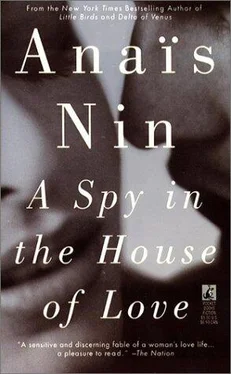She was compelled by a confessional fever which forced her into lifting the veil slightly, only a corner of it, and then frightened when anyone listened too attentively, especially Jay whom she did not trust, whom she knew found the truth only in the sense of exposure of the flaws, the weaknesses, the foibles.
As soon as Jay listened too attentively, she took a giant sponge and erased all she had said by an absolute denial as if this confusion were in itself a mantle of protection.
At first she beckoned and lured one into her world, then she blurred the passageways, confused all the images as if to elude detection.
“False mysteries,” said Jay savagely, baffled and irritated by her elusiveness. “But what is she hiding behind these false mysteries?”
Her behavior always aroused in him (in the kind of mind he had with an obsession for truth, for revelation, for openness, brutal exposure) a desire which resembled the desire of a man to violate a woman who resists him, to violate a virginity which creates a barrier to his possession. Sabina always incited him to a violent desire to rip all her pretenses, her veils, and to discover the core of her self which, by this perpetual change of face and mobility, escaped all detection.
How right he had been to paint Sabina always as a mandrake with fleshly roots, bearing a solitary purple flower in a purple-bell-shaped corolla of narcotic flesh. How right he had been to paint her born with red-gold eyes always burning as from caverns, from behind trees, as one of the luxuriant women, a tropical growth, excommunicated from the bread line as too rich a substance for everyday living, placing her there merely as a denizen of the world of fire, and content with her intermittent, parabolic appearances.
“Sabina, do you remember our elevator ride in Paris?”
“Yes, I do remember.”
“We had no place to go. We wandered through the streets. I remember it was your idea to take an elevator.”
(We were ravenous for e other, I remember, Sabina. We got into an elevator and I began to kiss her. First floor. Second floor. I couldn’t let go of her. Third floor, and when the elevator came to a standstill it was too late…I couldn’t stop, I couldn’t let go of her if all Paris had been watching us. She pressed the button wildly, and we went on kissing as the elevator came down. When we got to the bottom it was worse, so she pressed the button again, and we went up and down, up and down, while people kept trying to stop it and get on…)
Jay laughed uncontrollably at the memory, at Sabina’s audacity. At that moment Sabina had been stripped of all mystery and Jay had tasted what the mystery contained: the most ardent frenzy of desire.
The dawn appearing weakly at the door silenced them. The music had ceased long ago and they had not noticed. They had continued their own drumming in talk.
Sabina tightened her cape around her shoulders as if daylight were the greatest enemy of all. To the dawn she would not even address a feverish speech. She stared at it angrily, and left the bar.
There is no bleaker moment in the life of the city than that one which crosses the boundary lines between those who have not slept all night and those who are going to work. It was for Sabina as if two races of men and women lived on earth, the night people and the day people, never meeting face to face except at this moment. Whatever Sabina had worn which seemed to glitter during the night, lost its colors in the dawn. The determined expressions of those going to work appeared to her like a reproach. Her fatigue was not like theirs. Hers marked her face like a long fever, left purple shadows under her eyes. She wanted to conceal her face from them. She hung her head so that her hair would partly cover it.
The mood of lostness persisted. For the first time she felt she could not go to Alan. She carried too great a weight of untold stories, too heavy a weight of memories, she was followed by too many ghosts of personages unsolved, of experiences not yet understood, of blows and humiliations not yet dissolved. She might return and plead extreme tiredness, and fall asleep, but her sleep would be restive, and she might talk in her dreams.
This time Alan would not have the power to exorcise her mood. Nor could she tell him about the event which most tormented her: the man she had first seen some months ago from the window of her hotel room, standing under her very window reading a newspaper, as if waiting for her to come out. Once more she had seen him on her way to visit Philip. She had encountered him in the subway station, and he had let several subway cars pass by in order to take the one she was taking.
It was not a flirtation. He made no effort to speak to her. He seemed engaged in an impersonal observation of her. In Mambo’s Night Club he had sat a few tables away and he was writing in a notebook.
This was the way criminals were shadowed, just before being caught. Was he a detective? What did he suspect her of? Would he report to Alan? Or to her parents? Or would he take his notes downtown to all the awesome buildings in which they carried on investigations of one kind or another, and would she receive one day a notice asking her to leave the United States and return to her pla of birth, Hungary, because the life of Ninon de l’Enclos, or Madame Bovary was not permitted by the law?
If she told Alan that she had been followed by a man, Alan would smile and say: “Why, of course, this isn’t the first time, is it? That’s the penalty you pay for being a beautiful woman. You wouldn’t want it not to happen, would you?”
For the first time, on this bleak early morning walk through New York streets not yet cleaned of the night people’s cigarette butts and empty liquor bottles, she understood Duchamp’s painting of a “Nude Descending a Staircase.” Eight or ten outlines of the same woman, like many multiple exposures of a woman’s personality, neatly divided into many layers, walking down the stairs in unison.
If she went to Alan now it would be like detaching one of these cut-outs of a woman, and forcing it to walk separately from the rest, but once detached from the unison, it would reveal that it was a mere outline of a woman, the figure design as the eye could see it, but empty of substance, this substance having evaporated through the spaces between each layer of the personality. A divided woman indeed, a woman divided into numberless silhouettes, and she could see this apparent form of Sabina leaving a desperate and a lonely one walking the streets in quest of hot coffee, being greeted by Alan as a transparently innocent young girl he had married ten years before and sworn to cherish, as he had, only he had continued to cherish the same young girl he had married, the first exposure of Sabina, the first image delivered into his hands, the first dimension, of this elaborated, complex and extended series of Sabinas which had been born later and which she had not been able to give him. Each year, just as a tree puts forth a new ring of growth, she should have been able to say: “Alan, here is a new version of Sabina. Add it to the rest, fuse them well, hold on to them when you embrace her, hold them all at once in your arms, or else, divided, separated, each image will live a life of its own, and it will not be one but six, or seven, or eight Sabinas who will walk sometimes in unison, by a great effort of synthesis, sometimes separately, one of them following a deep drumming into forests of black hair and luxurious mouths, another visiting Vienna-as-it-was-before-the-war, and still another lying beside an insane young man, and still another opening maternal arms to a trembling frightened Donald.” Was this the crime to have sought to marry each Sabina to another mate, to match each one in turn by a different life?
Читать дальше












